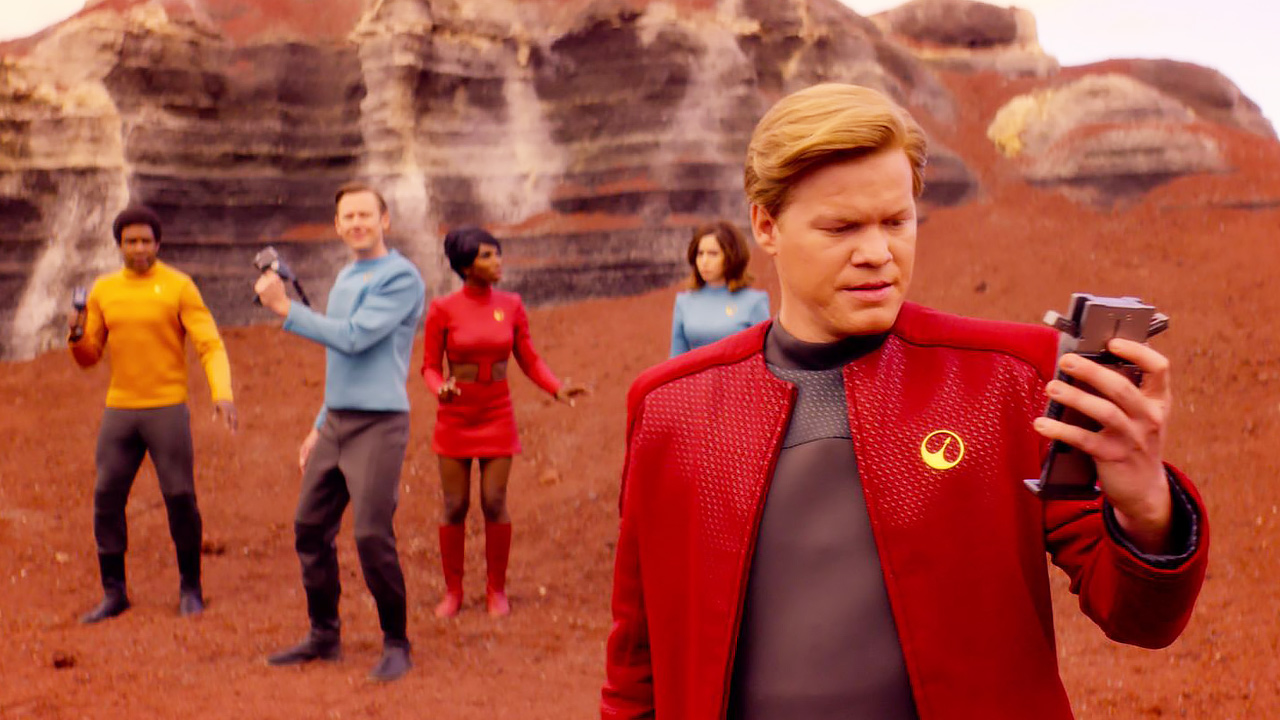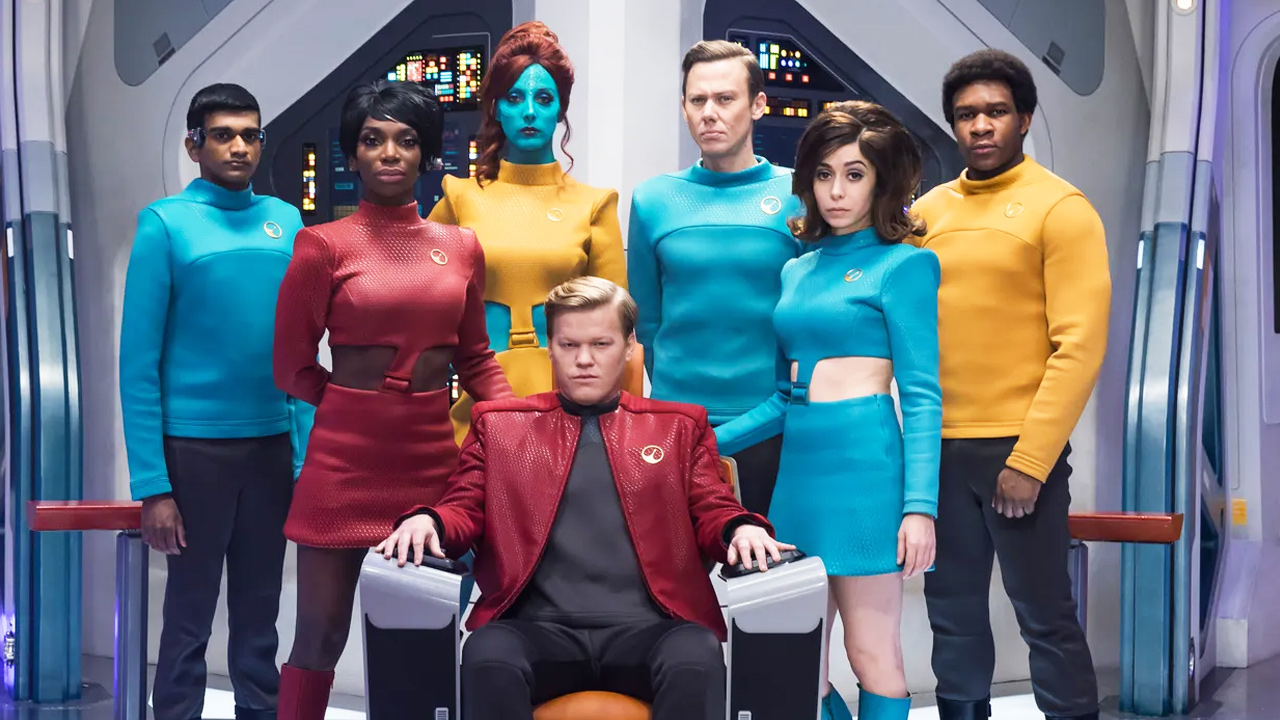Revisiting USS Callister – one of Black Mirror’s greatest episodes

A loving Star Trek parody; a showcase for Jesse Plemons in diabolical bastard mode; a troubling piece of speculative fiction about omnipotence…Luke Buckmaster is stoked that standout Black Mirror episode USS Callister is getting a sequel.
Netflix recently revealed that Black Mirror‘s upcoming seventh season will include a sequel to USS Callister—and that’s A-OK with me. This feature-length episode—which premiered in 2017, launching the show’s fourth season—is an ingenious piece of sci-fi television and one of the series’ all-timers. It begins as an innocuous Star Trek homage but charges into a simulation-theory-gone-bad narrative that conjures a villain for the ages: a malevolent god by way of a socially awkward CTO, played by the always reliable but rarely better Jesse Plemons.
Tinged in retro colour grading, the opening takes place on board a USS Enterprise-like spaceship as Plemons’ Captain Robert Daly drops boilerplate lines such as “it’s our only chance!”, guiding his crew through a crisis involving an aggressive toy-looking enemy ship. This fun opening winks at the audience from a higher reality—but the next scene brings it down to earth. That retro sheen is gone, replaced by a steelier and greyer scheme. We meet the “real-life” version of Daly’s character as he heads to his office at Callister Inc, the developers of a VR-like game called Infinity.
Despite being high up in the company’s chain of command, Daly is treated like a nobody. It’s clear he’s the kind of person people look down on, if they notice him at all. Plemons is so good in this role, bringing Philip Seymour Hoffman-esque droopiness, making us empathise with this cast down character—making us feel that nobody status.
Then Plemons, director Toby Haynes, and the screenwriters (William Bridges and Charlie Brooker) spin our moral compass around in circles and force a dramatic reassessment of our ethical considerations. It’s revealed that the Star Trek-like setting is a simulation Daly uses to live out his fantasies: to do the things he can’t do in real-life, be the person he can’t be. Inside the virtual world he’s dominant, confident, commanding—and a totally evil bastard. Daly uses DNA from his colleagues to create digital versions of themselves that he can boss around, terrorise, and treat as slaves. They aren’t just coding creations but entities that think and feel.
The plot springs to gear when a new employee, Cristin Milioti’s Nanette Cole, begins working at the company. She tells Daly she admires him and his coding but is soon advised by a colleague, Michaela Coel’s Shania Lowry, to keep her distance…which she can do in one reality, but not the other. Daly creates a virtual duplicate of Nanette to bring into the fold. Like the army major in the great The Twilight Zone episode Five Characters in Search of an Exit, which might have been an inspiration, Nanette 2.0 wakes up in the alternate world confused, distraught, and determined to launch an escape plan.

The others assure her they’ve tried everything. But she’s an agent of change, determined to break free of (in the words of one prisoner) “an eternal waking nightmare from which there is no escape.” After disobeying Daly, Nanette discovers the horrific extent of his wrath: he incurs revenge by removing her face, including her ability to see and breathe. He can, he explains, keep her here forever, “gasping for breath with a mouth that isn’t there.” I’ve never seen another torture scene quite like this. When Daly raises his hand, it looks a little like Darth Vader’s choke hold, but he’s not channeling the force: this guy is the force, the ruler of his universe, the angry deity.
Nobody could predict, from that hokey Trekkie opening, that USS Callister would go on to toss around many meaty ideas including challenging the common perception of a god. Believers of traditional religions such as Christianity think of God is an omnipotent benevolent force, in control of heaven and hell, allowing humans through the pearly gates upon the fulfilment of certain criteria. USS Callister feeds into an unsettling idea raised by Chuck Palahniuk in Fight Club: that if god exists, they might not like you. Another, more Rick and Morty-ish suggestion is that the creator of the universe might be some snivelling programmer—like Daly—who created an entire universe out of vengeance, or boredom.
The weird thing is how plausible this all seems. Pushing aside the issue of virtual characters having actual thoughts and feelings (the old sentience chestnut), Daly’s twisted behaviour rings absolutely true; you really believe some vile, narrow-minded prick like him could be that spiteful and reckless. It’s the emotional believability of the premise that draws us in; we don’t even necessarily think about the technology. What will this diabolically great villain get up to the sequel, if indeed he’s in it at all? Black Mirror delights in surprising and shocking us; I can’t wait to find out.
















